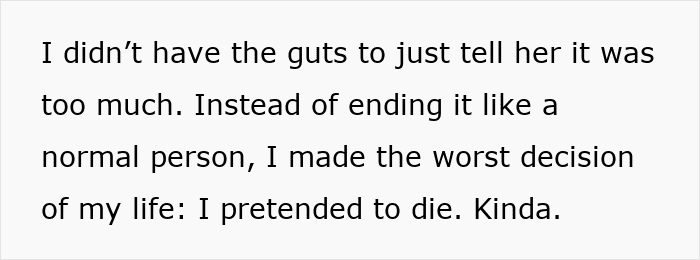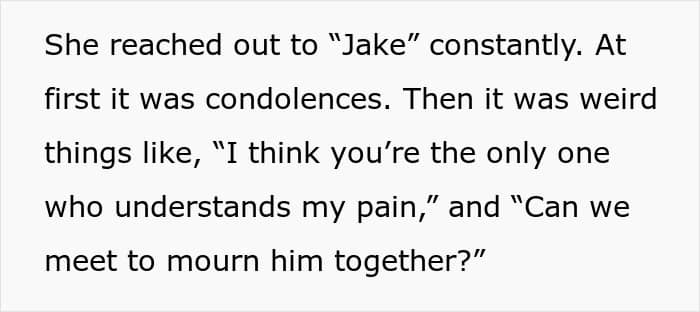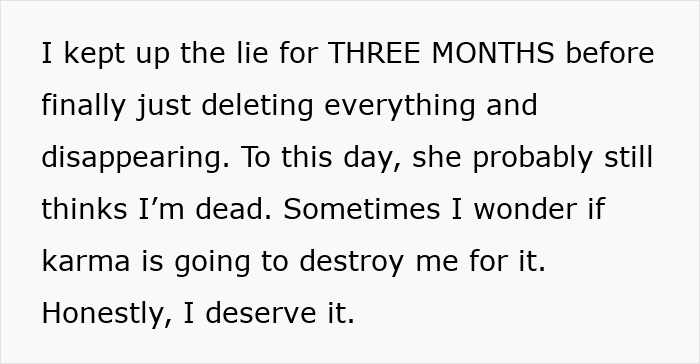As the famous Neil Sedaka song goes, “Breaking up is hard to do.” But it’s one of those things in life that very few of us can avoid. It’s usually best to just rip off the band-aid, while being polite and compassionate, of course. But nowadays, some people choose to skip the conversation altogether and opt for the ghosting method instead.
One man decided to be particularly creative and concoct an elaborate story about losing his life just to get out of having an uncomfortable conversation. Below, you’ll find all of the details of this man’s lies, that he’s recently confessed on Reddit, as well as a conversation with advanced Imago couples therapist, Shan Merchant.
RELATED:Breaking up with a partner can be extremely nerve-racking

So this man decided that he would rather disappear off the face of the Earth than have an uncomfortable conversation









The majority of Millennials and Gen Zers say they’ve been ghosted by someone they were dating
Breakups are never easy. Whether you politely give your partner the “it’s not you, it’s me” speech or end your relationship in a screaming match, the discomfort of hurting someone you once loved can feel like too much to handle. And many find themselves staying in relationships that aren’t working far longer than they should due to the fear of starting over, or FOSO.
According to a 2024 survey from Plenty of Fish, 45% of singles admit that they’ve been terrified of being single in the past. And 44% say that’s precisely why they dragged out a previous relationship much longer than they should have.
There are plenty of worries that can arise when you decide it’s time to end it with your partner. Will anyone else ever love you again? Will they hate you for wasting their time? Will you lose all of your mutual friends?
But if it’s simply the fear of how they’ll react that’s making you feel trapped, you might be tempted to ghost them. Ghosting is when someone cuts off contact cold turkey and appears to disappear out of nowhere. They’ll stop responding to calls or texts, might even stand up a date and seemingly vanish into thin air.
This behavior is particularly common amongst Gen Z and Millennials, who even got the term ghosting into the dictionary. Thriving Center of Psych reports that a whopping 84% of Zoomers and Millennials have been ghosted, and three quarters believe that it is appropriate in certain situations.
As for why people decide to disappear, some cite simply not being interested in continuing the relationship, while others say they do so to avoid confrontation or because they’re stressed or overwhelmed with the expectations placed on them. And sometimes, people do so because they’re struggling with their mental health.
While it might feel like the easy way out, ghosting can take a huge toll on the person who’s suddenly been cut off. Medical News Today notes that they might be confused, anxious or even depressed after receiving no explanation. Being ghosted can also negatively impact a person’s self-esteem, create trust issues or make them angry.

“There’s no perfect way to break up, but there is a respectful one”
To learn more about this topic, we got in touch with advanced Imago couples therapist, Shan Merchant. She was kind enough to have a chat with We and discuss why breakups are so difficult.
“Breaking up isn’t just about ending a relationship; it’s about confronting the discomfort of disappointing someone and the fear of being perceived as the ‘bad guy,’” the relationship expert says. “Many of us stay in relationships longer than we should, not because they’re fulfilling, but because we dread the confrontation and the guilt that might follow.”
“We often internalize the belief that leaving equates to failure or selfishness. But staying in a relationship that no longer serves you or the other person is avoidance,” Shan continued. “It’s delaying the inevitable and in the process, causes more harm. I also don’t think anyone is taught how to end a relationship with clarity and compassion. It’s a skill and, like any skill, takes practice.”
So is it ever appropriate to bend the truth when breaking up with someone to soften the blow? “It’s understandable that we want to protect people we care about. But when you lie to someone during a breakup, even to be ‘kind,’ you’re not giving them the gift of closure,” Shan says. “You’re creating confusion, which can lead to long-term emotional stuckness. People need truth to heal, that’s what allows them to make meaning out of the loss and eventually move forward.”
“From a couple’s therapist’s perspective, I know that people are deeply affected by how things end. If someone has a history of abandonment or betrayal, a vague or dishonest breakup can re-traumatize those core wounds,” the expert added. “There’s no perfect way to break up, but there is a respectful one. Prioritize transparency. Keep it simple. And trust that you’re doing the right thing by freeing both of you to find the right person.”
We also asked Shan if she could share some advice for anyone who’s scared of breaking up with their partner. “Fear is natural. But fear isn’t a reason to avoid a difficult conversation, it’s a reason to prepare for it,” she noted. “I’d suggest approaching the breakup as a conscious conversation, not just a rejection.”
“If you want to live with integrity, practice telling the truth earlier”
“Start by getting grounded in your truth. What are you feeling? What are your needs? Then, communicate those needs directly. Use I statements,” the expert shared. “Say, ‘I’ve been struggling to feel like myself in this relationship, and I need to honor that,’ instead of blaming or avoiding.”
“Make space to listen to your partner’s emotional response, and at the same time, know that you’re not responsible for how they feel,” Shan continued. “You’re responsible for how you speak your truth. That’s the work of being a conscious adult in a relationship, whether you’re beginning one or ending one.”
Finally, the expert noted that faking your own death might sound extreme, but she sees softer versions of that every day in her couples therapy room where people avoid having honest conversations that could shift everything.
“One of the most common ways this shows up is through affairs,” Shan says. “The deeper meaning of affairs isn’t about selfishness or deception. Often, they’re an attempt to reconnect with a lost part of the self – to feel wanted, alive, or seen again. But instead of turning toward their partner with that vulnerability, people act it out elsewhere. It’s not about [intimacy]; it’s a longing that felt too risky to express.”
“By the time the truth comes out, the damage is often far greater than it would’ve been if they’d just said: ‘Something doesn’t feel right, and I want to talk about it,’” she continued.
“If you want to live with integrity, practice telling the truth earlier,” the expert says. “Courage like this can repair a relationship. Or if it’s time to part, it allows you to end things with clarity and respect instead of crisis.”
We would love to hear your thoughts on this situation in the comments below, pandas. Then, you can find another We article discussing similar relationship issues right here.

Readers found the story amusing, but many noted that the man took his ghosting a bit too far























Later, the author added that he’s matured since this experience
